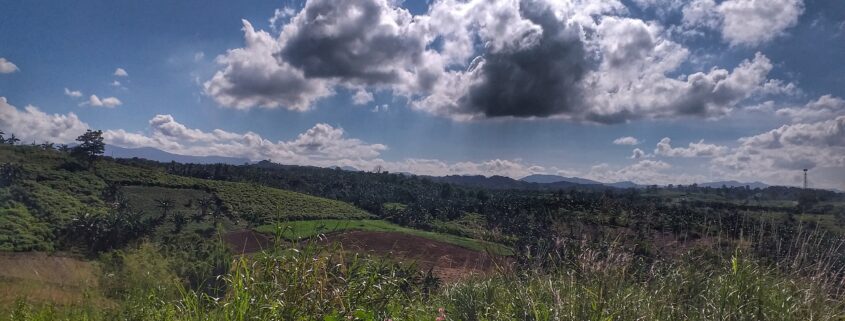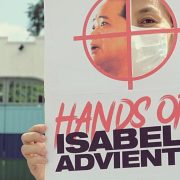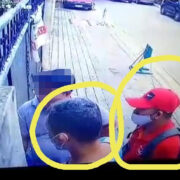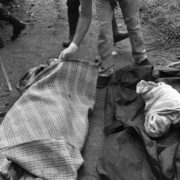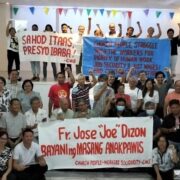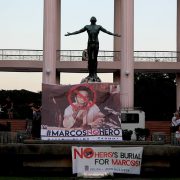Tungkong Mangga: From farmers’ paradise to stove of violence
By Raymund B. Villanueva
A fact-finding mission on the demolition of four farmers’ houses last Wednesday in Barangay Tungkong Mangga, San Jose del Monte City (SJDM), Bulacan was underway at 11 AM yesterday when guards armed with high-powered guns arrived and fired indiscriminately. The firing lasted for 10 minutes and forced the victims and members of the mission to run for their lives. When it finally stopped after what seemed an eternity to the mission participants, two were injured. Several had their bags, wallets, mobile phones and other equipment seized by the guards. The armed men are under the employ of Gregorio Maria “Greggy” Araneta III, husband of the late dictator Ferdinand Marcos’s daughter Irene and brother-in-law to presidential aspirant Marcos Jr.
Friday’s shooting had been the third of a series of harassment against farmers of the community in a year, mission co-organizer Kilusang Magbubukid ng Pilipinas (KMP) reported. Last year, more cases of harassment were also reported, causing the residents to fear for their lives and livelihood.
READ: Araneta guards fire guns at farmers in SJDM
Where and what is Tungkong Mangga? Why are its farmers being harassed and evicted? Who is Greggy and what is his company Araneta Properties, Inc. (API) doing there? Who rightfully owns the land disputed by poor farmers and a powerful interest that tries to impose its will with guns and threats of death?
Land of sweet bananas
Tungkong Mangga is not a remote and wild place that yesterday’s incident may suggest. It is a community located just north of Quezon and Caloocan cities where Metro Manila’s sprawl is seen atop its rolling hills. It boasts of a huge shopping mall, many restaurants and other establishments, even high-end residential subdivisions developed by the Ayala, Villar, Sta. Lucia and Araneta business groups. Its undulating roads are favorites to weekend bikers who catch their breaths in the area’s many summits, drinking coffee and other refreshments from guerilla cafes put up by enterprising residents. The barangay is called such because of the many mango trees dotting the stove-shaped area.
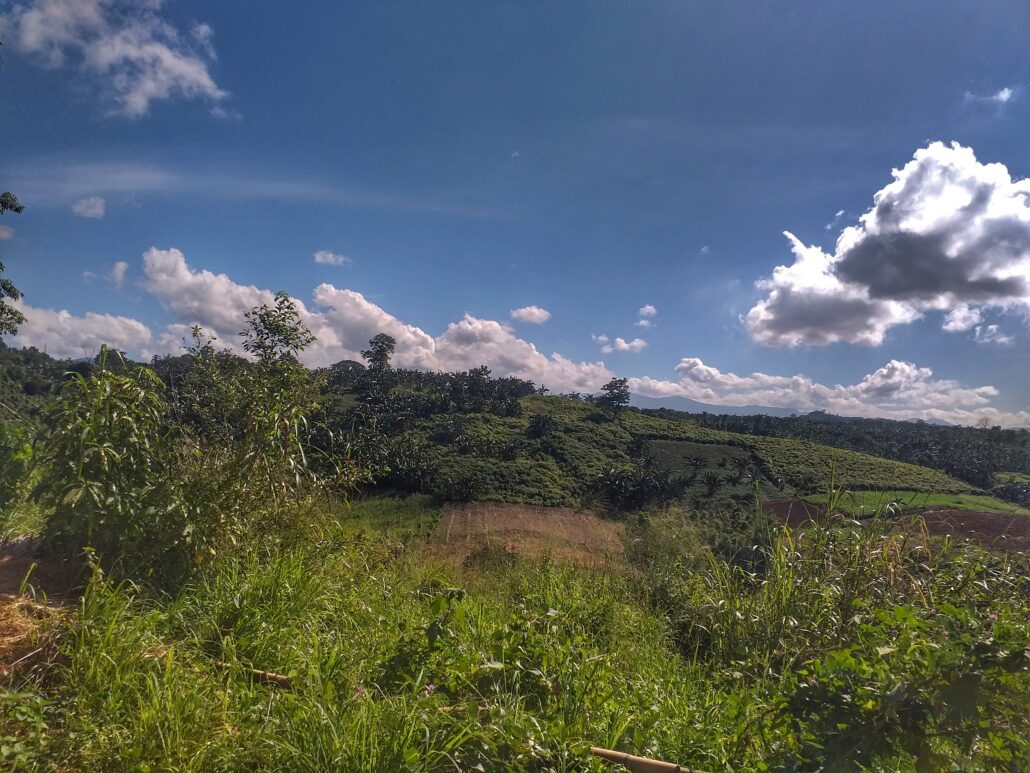
A large portion of Tungkong Mangga remains agricultural however. From many vantage points, one sees many hectares of farms planted with bananas and other fruit and vegetable crops. It is a major supplier of food to several major markets of Quezon City such as those located in Novaliches and along Commonwealth Avenue. Of particular pride to its farmers is a variety of saba banana that are smaller yet much sweeter than the more common ones we have as turon and banana Qs.
Increasing violence and terror are happening where these farms and the houses of the farmers who till them are located however. The once idyllic place is increasingly ringed by barbed wire fences and guarded by armed personnel of SECURICOR Security and Investigation Services, Inc. While residents freely moved about in the past, they now have to seek permission from the guards for ingress and egress to their communities and farms. They often could not take and sell their produce to the markets anymore.
Terror against food producers
News of Friday’s shooting first reached Kodao through a Facebook Live video of farmer and Alyansa ng Magbubukid ng Bulacan (AMB) member Lea Jordan. She was screaming for help as she was running away from the API guards who shot at them at a clearing where the mission gathered.
LISTEN: Will the UN Decade of Family Farming solve lack of land among poor Filipino farmers?
Lea’s family was from Samar who migrated to SJDM more than three decades back when she was but a child in the early 1990s. In an interview with Kodao last November, Lea said Tungkong Mangga was still forested and known as public land when they arrived. Many families have already settled in the area before them and, like her family, poor and landless from other parts of the country. Over time, more than a hundred families developed about the same number of hectares in the area into productive farms.
Lea was actually on her way to an AMB meeting to have themselves registered with the Department of Agriculture (DA) to be officially recognized by the government as farmers when interviewed by Kodao. She said that, if successful, they will be qualified for support and grants from the DA and it will be helpful for their struggle against the exemption of their land from the government’s agrarian reform program.
On the first month of this year, however, a crying, fleeing and terrorized Lea is what we hear of her first.
WATCH LEA’S FB LIVE VIDEO HERE: https://www.facebook.com/lea.jordan.9/videos/284527883591106/
Farmlands to financial center
Lea and her neighbors’ troubles began when the DAR has exempted their farms from the government’s Comprehensive Agrarian Reform Program (CARP) in 1997. Government said parts of the area have over 18-degree slopes that supposedly render these “non-viable for agricultural use.” The land’s regular yield of produce, however, proves the reasoning faulty. The farmers of Tungkong Mangga have in fact regularly participated in agricultural fairs in Metro Manila over the years that showcase their organically-raised fruit and vegetables.
Since CARP’s exemption of the productive farms, Greggy had started claiming ownership of the area. There is no online source proving the Araneta clan’s previous ownership of the land it says it owns. They clan were descendants of a Basque family who participated and obviously benefited from Spanish conquest of the archipelago.
The earliest citation available of the family’s presence in the area was the establishment of the Araneta Institute of Agriculture in 1946 that has since transferred to Malabon City and is now known as the De La Salle Araneta University (also formerly known as the Gregorio Araneta University Foundation before its integration into the De La Salle system in 1987). In 2017 newspaper interviews, Greggy claimed that about 2,000 hectares in the area were owned by his grandfather and Malolos Convention participant Gregorio. “Most of the land is owned by my family,” Greggy told the Inquirer, adding that this was where his grandfather used to enjoy horseback riding.
There were stories of a certain Hacienda Araneta near the area but was known to be mainly located in adjacent Rodriguez (Montalban), Rizal. Incidentally, long-time residents of Barangay Mascap in Rodriguez also complain of similar violent eviction tactics by the Aranetas.
With the government approval of the MRT-7 project in 2012 (when Greggy’s cousin Manuel “Mar” Araneta Roxas was transportation and communications and, immediately after, interior and local government secretary) Greggy was reported to have intensified his claims over 140 hectares in the area. The place happens to be where the ongoing MRT-7 rail project shall have its first station and train depot. This is where Greggy said he will build “the best township” beside the La Mesa Dam Reservoir, much bigger and potentially much more lucrative for his clan than their famed Araneta Center in Cubao, Quezon City.
But the Unyon ng mga Manggagawa sa Agrikultura (UMA) pointed out that Greggy’s API was only incorporated as a legal entity, long after many of the farmers have settled and developed the area. The peasant group also accused the DAR of exempting Tungkong Mangga from CARP coverage to accommodate Greggy’s takeover.
“The peasant families of San Jose Del Monte had been tilling the farmlands of Tungkong Mangga even before [API] would be incorporated in 1988,” explained UMA chairperson Antonio Flores. “DAR’s facilitation of Araneta’s landgrab is unconscionable, and nothing short of criminal,” he added.
UMA said that since August last year, Greggy and API have been sending personnel from SECURICOR to threaten and intimidate the residents. Security personnel had even set up control gates along farm-to-market roads in the area to make the passage of agricultural produce difficult. In 2020, a unit of the Philippine Army has even encamped right in the midst of a residential area to intimidate the farmers. A month prior to the latest onset of the latest round of harassment, UMA reported than an API legal representative told residents of Tungkong Mangga’s Sitio Dalandanan to vacate their farms and let Greggy take over the disputed land.
Who should own the land?
UMA said yesterday’s incident was to prevent the fact-finding mission from looking into the ongoing demolition of houses in the area to make way for another private subdivision that would be part of Greggy’s future township. The group opposes the conversion of productive farm lands into more commercial projects.
“It is one thing for a company to grab land from the farmers who have been making it productive for decades,” said Flores. “But to steal land with the intention of converting its use to non-agricultural purposes? This is the height of criminality. On top of displacing peasants, this landgrab curtails the country ability to produce food,” Flores added.

In Kodao’s November interview with Lea, she made clear that they settled and tilled the land in the full belief it was public. She also said that they are willing to pay for the land they now occupy at just prices and friendly schemes. “Dito na kami lumaki. Dito na ako nagka-asawa at nagka-anak. Ito ang aming buhay. Ito ang pinili naming buhay,” she added. (This is where we grew up, married and had children. This is our life. This is the life we choose.)
UMA urges electoral candidates to look into the ongoing violence in Tungkong Mangga and consider it a symptom of the larger problem of peasant landlessness. “Until a program for genuine agrarian reform could be put in place, companies like API would continue to grab land, seize sovereignty over food production away from peasants, and endanger not only peasant lives but the entire country’s food security,” the group said. #

